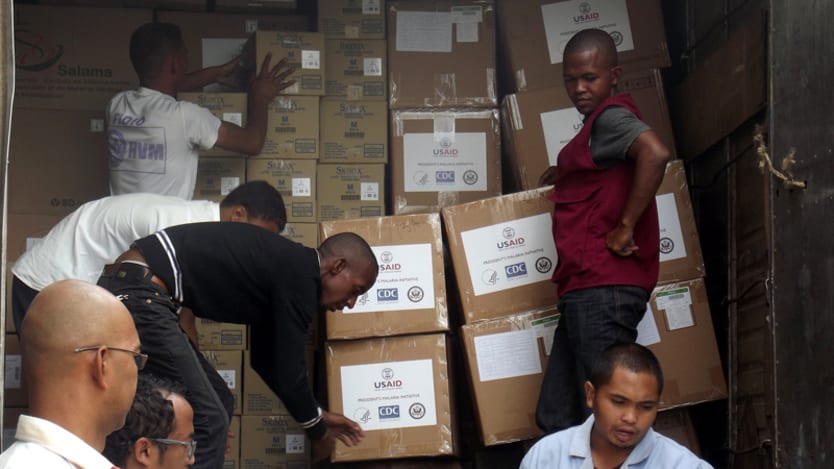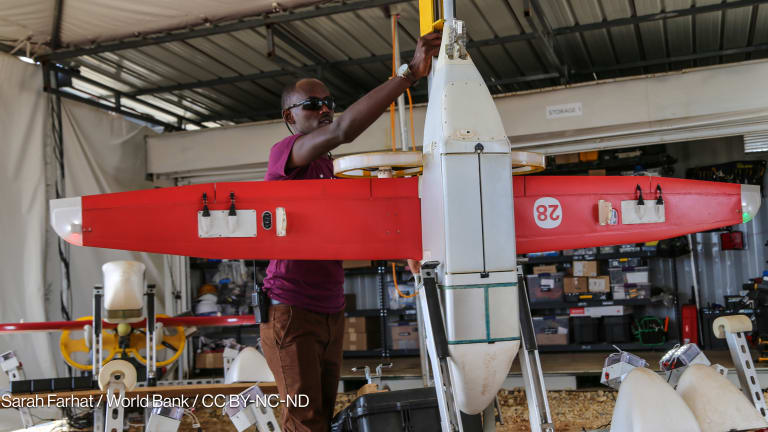Exclusive: Congress to question USAID over $9.5 billion health project 'fiasco'

WASHINGTON — A U.S. congressional member intends to hold a hearing to raise concerns about the U.S. Agency for International Development’s largest-ever contract — a $9.5 billion program implemented by Chemonics International, which coordinates the procurement and delivery of lifesaving health products in more than 50 countries.
Rep. Chris Smith, a Republican from New Jersey, told Devex he is concerned that Chemonics is “mismanaging” the project — describing it as an “apparent fiasco” — and he said he wants to learn more about USAID’s selection of the contractor as its implementing partner for a project that supports the U.S. government’s largest global health initiatives. Smith said he is particularly worried about any negative effects poor performance could have on the President’s Emergency Plan for AIDS Relief.
Devex first revealed that the Global Health Supply Chain – Procurement Supply Management project was encountering serious problems last month. Progress reports — which were posted online after Devex requested them — revealed that only 7 percent of shipments delivered during the last reported quarter arrived ‘on time and in full,’ a standard indicator of a supply chain’s effectiveness.
In response to Devex’s story, USAID Administrator Mark Green expressed his anger about the project’s poor performance and said the agency is watching closely to ensure it improves.
Read related Devex coverage:
► Exclusive: Documents reveal largest USAID health project in trouble
► USAID chief 'angry' about agency's largest health project
► Chemonics acknowledges 'challenges' with supply chain project, cites 'proactive steps'
USAID’s leadership will not be the only ones watching.
“I am very concerned by allegations that Chemonics is mismanaging a $9.5 billion contract, in particular because lives are put at risk when a contractor cannot deliver antiretrovirals on time. A 7 percent on time delivery rate is shocking, especially when the previous consortium was consistently delivering supplies ‘on time and in full’ well over 80 percent of the time,” Rep. Smith said in a statement emailed to Devex.
“I intend to hold a hearing that will require USAID to account for how this contractor was chosen, why this problem was allowed to fester and what is being done to fix it. I also want to know why PEPFAR, a gold star humanitarian program that has brought life and hope to so many, was excluded by USAID from reviewing bids, when it is the PEPFAR program that is most directly impacted by this apparent fiasco,” he added.
Devex has learned that the initial hearing — which will be public — will likely seek witnesses from the U.S. government and largely focus on oversight of the project and decision-making in the contracting process. Smith chairs the House Foreign Affairs subcommittee on Africa, global health, global human rights, and international organizations.
"The performance problems, including the delays in the delivery of drugs and health commodities, identified in the Global Health Supply Chain Procurement and Supply Management contract are unacceptable. USAID is holding the contractor accountable, and is actively working to ensure that life-saving medicine and supplies reach those who need them in a secure, timely, and cost-efficient manner,” USAID spokesperson Clayton McCleskey wrote to Devex in an email.
“Administrator Green takes seriously USAID’s responsibility to ensure the proper stewardship of the taxpayers' money. USAID officials have briefed Congress on multiple occasions throughout this process, and the agency will continue to consult with Congress as it addresses performance gaps," McCleskey added.
The spokesperson also informed Devex that Green previously called a meeting — currently scheduled for Monday — of the agency’s risk management committee, to examine how USAID’s contracts are managed from a corporate risk perspective. The meeting underscores previous comments the USAID administrator has made about his interest in exploring procurement reform options during his tenure at the agency.
After Devex informed Chemonics of Rep. Smith’s intention to hold the hearing, the company’s spokesperson Jane Gotiangco said they welcome congressional oversight “and share the U.S. government’s commitment to responsible stewardship of taxpayer resources.”
“In regard to Congressman Smith’s questions, I want to begin with the most important point: People are getting the medicines they need, including antiretrovirals, when they need them,” Gotiangco said in a statement emailed to Devex, adding that Chemonics is addressing performance deficiencies, some of which are “wrapped up in the way performance is measured.”
“We’ve worked closely with USAID to understand and respond to the challenges we’ve faced. As such, we are implementing a comprehensive plan of action and have already completed five of the seven major areas, including changes in leadership and empowering the right people on the ground to do the work,” Gotiangco said. “I think you’ll see in upcoming reports that we are on the right path. I’m confident that the steps we are taking will result in significantly improved performance in the months ahead. We believe strongly in the power of a streamlined, efficient supply chain that ensures patients receive the medicines they need, while also delivering at a lower cost.”
In April 2015, USAID announced its decision to award the massive health supply chain contract to Chemonics, unseating its previous implementing partner, a group led by John Snow Inc. That group, the Partnership for Supply Chain Management, filed protests over USAID’s decision with both the Government Accountability Office and the U.S. Federal Court of Appeals. Both were denied.
Chemonics began implementing the project in 2016. The most recent GHSC — PSM progress reports — which have only been posted through March 31, 2017 — show a precipitous decline in performance, with the project’s OTIF rate dropping from 67 percent, to 30.7 percent, to 7 percent over the last three reported quarters.
Read more international development news online, and subscribe to The Development Newswire to receive the latest from the world’s leading donors and decision-makers — emailed to you free every business day.
Search for articles
Most Read
- 1
- 2
- 3
- 4
- 5








